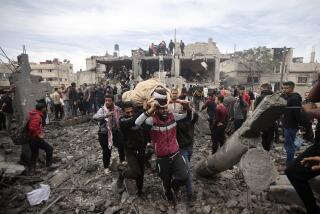NEWS ANALYSIS : U.N.’s Somalia Mission Shaken as Toll Mounts : Africa: Fugitive warlord’s stature grows amid escalation of urban warfare in Mogadishu.
- Share via
JOHANNESBURG, South Africa — The United Nations’ experiment in peace “enforcement” in Somalia has been badly shaken by the fruitless three-week hunt for warlord Mohammed Farah Aidid, the escalation of urban warfare and the deaths of 35 U.N. troops and four foreign journalists.
With each passing day, the stature of the fugitive Aidid in the eyes of many Somalis is growing--and the U.N.’s reputation is falling. Somalis like a winner, and to many it seems that Aidid is winning.
Despite a $25,000 reward for his arrest and the high-technology firepower at the U.N.’s disposal, Aidid has eluded arrest, gilding his reputation as a warrior battling foreign intervention. And his small bands of gunmen have confounded the 19,000-strong U.N. force, dragging it into an ugly street fight that it seems incapable of winning.
“You can’t doubt the personal courage of Somalis,” said an American diplomat with long experience in the country. “They are natural guerrilla fighters. And they are very xenophobic.”
The latest U.N. attack Monday, which left 15 Somalis dead and spurred an angry mob to kill four foreign journalists, has opened a nasty new front in the halting international effort to save Somalia.
In the five weeks since Aidid’s forces killed 24 Pakistani troops, U.N. soldiers and employees have become targets of Aidid loyalists. Anger toward Western--especially American--journalists has been growing as well, fed by a feeling that they are in league with the U.N. operation.
Now, though, all foreigners, including the hundreds of relief officials who work near the battle zone and have tried to remain neutral, have become likely targets. The attacks Monday were the worst against foreign civilians since the country slipped into anarchy and famine three years ago.
And the countrywide relief effort, which to a large degree is run from offices near Aidid’s former headquarters in Mogadishu, is under threat even as it begins to make progress toward helping the country back onto its feet. So far, six aid workers have been killed by bandits and militiamen.
On Tuesday, the International Committee of the Red Cross differed sharply with the official U.N. count of Somali deaths in the U.N. attack on Monday. The Red Cross, which checked two hospitals in the city, said 54 Somalis were killed and 174 wounded. U.N. officials have said that only 15 Somalis--all of them armed men--were killed.
Aidid’s supporters claimed that 73 were killed.
The bodies of three of the journalists killed Monday--an Associated Press photographer, a Reuters photographer and a Reuters television sound technician--were recovered Tuesday. The body of the fourth journalist, a Reuters photographer, had been retrieved on Monday.
When Somali employees and armed bodyguards working for the news agencies found AP photographer Hanis Krauss’ body Tuesday, they said it was surrounded by a hostile crowd. Military doctors later said Krauss had been killed by a gunshot to the chest and his body was bruised, apparently from thrown rocks.
The U.N. operation in Somalia, the first ever authorized to use “coercive disarmament” to restore peace rather than merely return fire, has come under increasing criticism in recent days and weeks, due primarily to the highly public, unsuccessful search for Aidid and the tit-for-tat attacks that have ensued.
The helicopter assault on a house belonging to one of Aidid’s allies on Monday had been designed to disrupt Aidid’s command structure and avenge the July 7 killing of six Somali employees of the United Nations.
Italy, which has 2,400 troops in its former colony and has suffered half a dozen fatalities in recent weeks, has asked the world body to temporarily halt military actions in the capital and try to restart negotiations among rival Somali factions. It also has sought a greater say in the U.N.’s Somalia command.
Fabbio Fabbri, the Italian defense minister, said the United Nations could conduct “a disarming operation in a grand manner” if a cooling-off period did not work.
However, U.N. officials in New York rebuked Italy’s suggestion, which was the first public sign of a weakening resolve among the 32 countries that have contributed troops to the Somalia effort.
Resuming negotiations with Aidid is not an option, U.N. officials say. Under a U.N. resolution, which calls for those responsible for the murder of the Pakistanis to be punished, the U.N. forces are duty-bound to arrest Aidid.
In London on Tuesday, former British Prime Minister Edward Heath specifically criticized the U.N. effort to hunt down Aidid, saying it is costing innocent lives and fueling hatred for the West.
U.N. officials have blamed Aidid’s gunmen for the urban warfare that destroyed the tentative peace that had been established in Mogadishu. They also see Aidid’s guerrilla attacks as a test of U.N. will that cannot go unanswered.
And political analysts say Aidid harbors ambitions of becoming president of Somalia and fears that his dream is likely to be thwarted by a U.N.-brokered peace.
More to Read
Sign up for Essential California
The most important California stories and recommendations in your inbox every morning.
You may occasionally receive promotional content from the Los Angeles Times.











